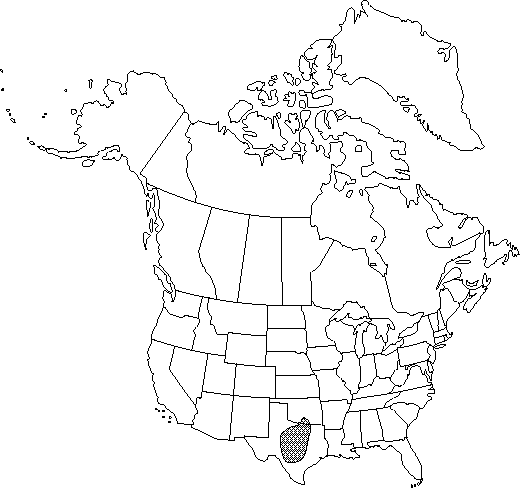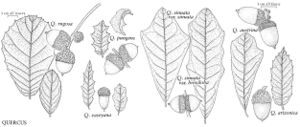Difference between revisions of "Quercus sinuata var. breviloba"
J. Arnold Arbor. 25: 439. 1944.
FNA>Volume Importer |
FNA>Volume Importer |
||
| Line 38: | Line 38: | ||
}}<!-- | }}<!-- | ||
| − | --><span class="statement" id="st- | + | --><span class="statement" id="st-undefined" data-properties=""><b>Shrubs </b>or trees, rarely small, usually moderate, (0.5-)1-3(-5) m, often clonal with multiple trunks. <b>Leaves</b>: petiole 2-3 mm. <b>Leaf</b> blade (25-)30-60(-100) × (15-)20-40(-60) mm. <b>Acorns</b>: cup saucer-shaped to shallowly cup-shaped, rarely deeper, to 3-8 mm deep × 8-12 mm wide, enclosing 1/4 nut, rarely more, base flat, rounded, or constricted, margin thin; nut depressed-ovoid to oblong, 7-12(-15) × 7-10 mm, glabrous.</span><!-- |
-->{{Treatment/Body | -->{{Treatment/Body | ||
| Line 44: | Line 44: | ||
|habitat=Open oak woodlands, dry scrublands, margins of grasslands, and along streams and arroyos, on limestone, rarely on granitics | |habitat=Open oak woodlands, dry scrublands, margins of grasslands, and along streams and arroyos, on limestone, rarely on granitics | ||
|elevation=200-600 m | |elevation=200-600 m | ||
| − | |distribution=Okla.;Tex.;Mexico (Coahuila | + | |distribution=Okla.;Tex.;Mexico (Coahuila;Nuevo León;and Tamaulipas). |
|discussion=<p>Quercus sinuata var. breviloba replaces var. sinuata on the Edwards Plateau of Texas and extends south at lower elevations along the eastern side of Sierra Madre Oriental in northern Nuevo León and Tamaulipas. Although habitats of these two varieties are very different, along streams through limestone hills in central Texas the two varieties are in contact, and numerous problematic, morphologically intermediate forms may be found. The lack of broad geographic sympatry and intergradation argue for the treatment of these two taxa at varietal rank.</p> | |discussion=<p>Quercus sinuata var. breviloba replaces var. sinuata on the Edwards Plateau of Texas and extends south at lower elevations along the eastern side of Sierra Madre Oriental in northern Nuevo León and Tamaulipas. Although habitats of these two varieties are very different, along streams through limestone hills in central Texas the two varieties are in contact, and numerous problematic, morphologically intermediate forms may be found. The lack of broad geographic sympatry and intergradation argue for the treatment of these two taxa at varietal rank.</p> | ||
|tables= | |tables= | ||
| Line 64: | Line 64: | ||
|habitat=Open oak woodlands, dry scrublands, margins of grasslands, and along streams and arroyos, on limestone, rarely on granitics | |habitat=Open oak woodlands, dry scrublands, margins of grasslands, and along streams and arroyos, on limestone, rarely on granitics | ||
|elevation=200-600 m | |elevation=200-600 m | ||
| − | |distribution=Okla.;Tex.;Mexico (Coahuila | + | |distribution=Okla.;Tex.;Mexico (Coahuila;Nuevo León;and Tamaulipas). |
|reference=None | |reference=None | ||
|publication title=J. Arnold Arbor. | |publication title=J. Arnold Arbor. | ||
|publication year=1944 | |publication year=1944 | ||
|special status=Selected by author to be illustrated | |special status=Selected by author to be illustrated | ||
| − | |source xml=https://jpend@bitbucket.org/aafc-mbb/fna- | + | |source xml=https://jpend@bitbucket.org/aafc-mbb/fna-data-curation.git/src/9216fc802291cd3df363fd52122300479582ede7/coarse_grained_fna_xml/V3/V3_1066.xml |
|genus=Quercus | |genus=Quercus | ||
|section=Quercus sect. Quercus | |section=Quercus sect. Quercus | ||
|species=Quercus sinuata | |species=Quercus sinuata | ||
|variety=Quercus sinuata var. breviloba | |variety=Quercus sinuata var. breviloba | ||
| − | |||
| − | |||
| − | |||
| − | |||
| − | |||
| − | |||
| − | |||
| − | |||
| − | |||
| − | |||
| − | |||
| − | |||
| − | |||
| − | |||
| − | |||
| − | |||
| − | |||
| − | |||
| − | |||
| − | |||
| − | |||
| − | |||
| − | |||
| − | |||
| − | |||
| − | |||
| − | |||
}}<!-- | }}<!-- | ||
-->[[Category:Treatment]][[Category:Quercus sinuata]] | -->[[Category:Treatment]][[Category:Quercus sinuata]] | ||
Revision as of 13:30, 27 July 2019
Shrubs or trees, rarely small, usually moderate, (0.5-)1-3(-5) m, often clonal with multiple trunks. Leaves: petiole 2-3 mm. Leaf blade (25-)30-60(-100) × (15-)20-40(-60) mm. Acorns: cup saucer-shaped to shallowly cup-shaped, rarely deeper, to 3-8 mm deep × 8-12 mm wide, enclosing 1/4 nut, rarely more, base flat, rounded, or constricted, margin thin; nut depressed-ovoid to oblong, 7-12(-15) × 7-10 mm, glabrous.
Phenology: Flowering spring.
Habitat: Open oak woodlands, dry scrublands, margins of grasslands, and along streams and arroyos, on limestone, rarely on granitics
Elevation: 200-600 m
Distribution

Okla., Tex., Mexico (Coahuila, Nuevo León, and Tamaulipas).
Discussion
Quercus sinuata var. breviloba replaces var. sinuata on the Edwards Plateau of Texas and extends south at lower elevations along the eastern side of Sierra Madre Oriental in northern Nuevo León and Tamaulipas. Although habitats of these two varieties are very different, along streams through limestone hills in central Texas the two varieties are in contact, and numerous problematic, morphologically intermediate forms may be found. The lack of broad geographic sympatry and intergradation argue for the treatment of these two taxa at varietal rank.
Selected References
None.
